Want to speak conversational Japanese? You’ll need common Japanese Conversational Phrases: Responses & Reactions. In this quick lesson, you’ll learn 30 of them! This is great for Beginners and most of these phrases are super casual. So, you’ll learn how to use various responses/reactions. And you’ll sound like a native.
Good? Good.
So take this lesson & learn some Japanese conversational phrases!
- Read and review and review and review: SUCCESS comes from repetition and practice!!
- Print it out as physical review material (I do this a lot)
- Leave a comment with your sentences
✅ Hey, if you REALLY want to learn & speak Japanese with a complete learning system, (2,000+ audio/video courses, apps, study tools and more) Sign up at JapanesePod101 (click here) and start learning! I recommend ’em as a teacher & learner.
Learn TOP 30 Japanese Conversational Phrases
1. I’m very happy for you.
- そりゃよかった、私もうれしい。
- Sorya yokatta, watashi mo ureshii.
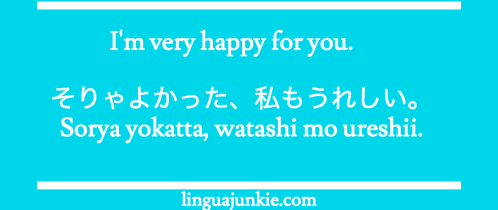
Wondering what sorya is? It’s “sore wa,” meaning “that is.” However, if you want to make it super casual or slang, you’d say “sorya.” So the sentence literally means – “That’s great, I’m also happy!”
2. I feel absolutely good.
- 最高にいい気分。
- Saikou ni ii kibun.
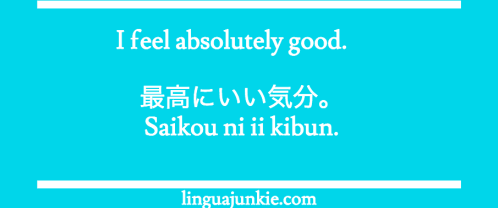 Saikou is a commonly used word. Basically it means “best” or “awesome.” And kibun means “feeling/mood” but it refers to your overall well being or how you’re feeling today. What’s your kibun, bro?
Saikou is a commonly used word. Basically it means “best” or “awesome.” And kibun means “feeling/mood” but it refers to your overall well being or how you’re feeling today. What’s your kibun, bro?
3. I’m a bit nervous about this.
- これについて、ちょっと心配があって。
- Kore ni tsuite, chotto shinpai ga atte.
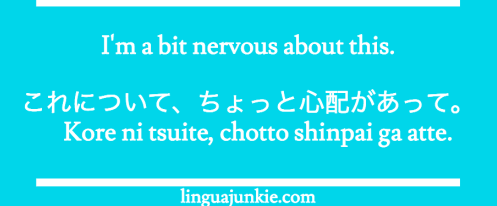 Kore means “this” and ni tsuite is “about.” So, it’s like saying… “about this, I’m a little worried.” So you know, shinpai means “worry” and when it says “shinpai ga aru,” it means you’re worried.
Kore means “this” and ni tsuite is “about.” So, it’s like saying… “about this, I’m a little worried.” So you know, shinpai means “worry” and when it says “shinpai ga aru,” it means you’re worried.
4. I’m really worried
- すごく心配
- Sugoku shinpai
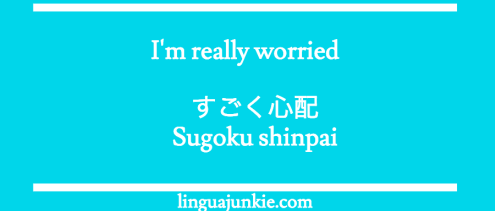 Now, lets say you’re REALLY worried. Add “sugoku” to amplify your worries. However, if you ask this Lingua Junkie, amplifying your worries doesn’t sound healthy.
Now, lets say you’re REALLY worried. Add “sugoku” to amplify your worries. However, if you ask this Lingua Junkie, amplifying your worries doesn’t sound healthy.
5. So what?
- だから?
- Dakara?

One of the best Japanese conversational phrases to know. So what!? Yes, it’s rude, but you love it. I passed my test. So what? I’m learning Japanese. So what?
6. I’m in the same boat.
- 僕も同じ境遇だ。
- Boku mo onaji kyouguu da.
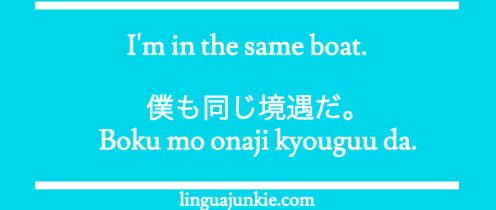
Good response for conversations. It just means that you’re in the same situation. There’s no reference of a “boat” in the phrase. Kyouguu means “circumstance” and onaji means “same.”
7. I mean it!
- 本気で言ってんだ!
- Honki de ittenda!
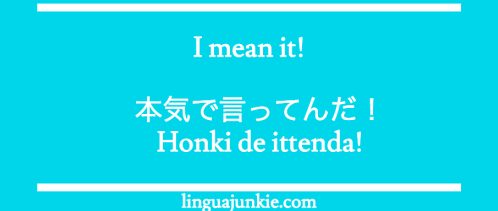
Did someone not believe what you said? Well, let’s add some emphasis. Honki de means “for real” or “seriously.”
8. That’s so tacky.
- すごい悪趣味だね。
- Sugoi akushumi da ne.
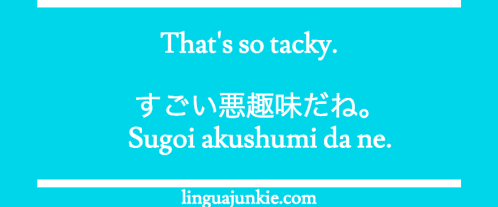
Akushumi means “bad taste.” So, if you see someone wearing a Pokemon outfit… or dye their hair green or purple, let them know the deal. Another one of those “bad” Japanese conversational phrases but that are actually good to know.
9. I didn’t think it was that bad.
- 私は、それほど悪いとは思わなかったな。
- Watashi wa, sore hodo warui to wa omowanakatta na.
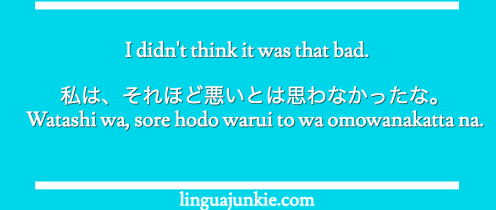
You liked the movie. Your friend didn’t. What’s a friend to do? Defend the movie and let your friend know the deal. All of the words in this phrase are fairly basic. The one grammar you should know is hodo. The word that comes before hodo is simply being pointed at – or emphasized. Good grammar point to know, junkies.
10. Let’s see your photos.
- 君の写真を見ようよ。
- Kimi no shashin wo miseyouyo.
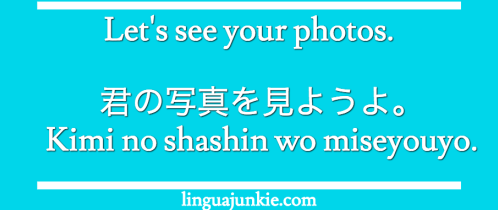
The things you’ll see on people’s Photo App on the iPhone/Android. That’s why this is a useful Japanese conversational phrase to know. Miseyou-yo comes from the verb – miseru – to show.
11. It’s horrible/disgusting.
- 最低だ。
- Saitei da.
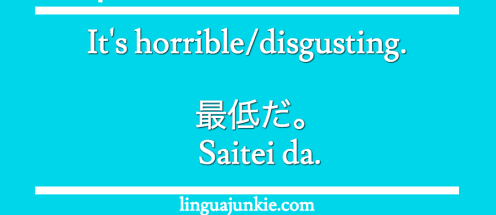
Saitei is the opposite of saikou. And it’s also used just as much to describe things that are just awful. Situations. Experiences. What someone said. How someone acted. Oh, and saitei means “lowest” or “worst.”
12. I’ve got an idea.
- いいこと思いついた。
- Ii koto omoitsuita.
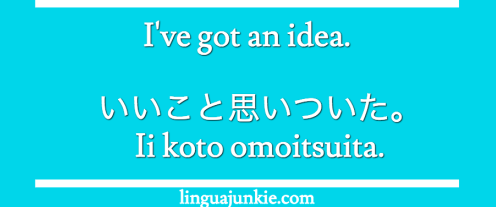
Good Japanese conversational phrase overall. Sometimes you’ve thought of something. And you want to express that. Ii koto means “good thing” and omoi tsuku means to “to think of” or “to come into one’s mind.”
13. It’s been fun talking with you.
- 君と話せてすごく楽しかったよ。
- Kimi to hanasete sugoku tanoshikatta yo.
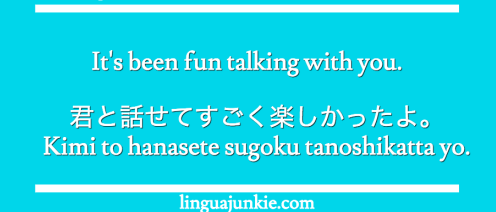
Very common phrase to use amongst friends. You might look at this and think “I don’t say this in English…” unless you’re writing a phony, polite note – but the Japanese have a culture of politeness and they mean this when they say it.
14. I do not envy you at all.
- 全然うらやましくないよ。
- Zenzen urayamashikunai yo.
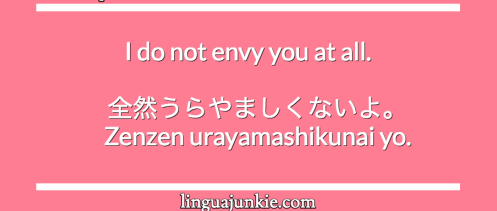
Urayamashii means jealous. Do you know someone that’s NOT learning Japanese? Don’t be jealous of them… at all. In fact, they should be jealous of you. Tell them the Main Junkie from Linguajunkie.com said so.
By the way, if you’re interested in learning Japanese – I recommend JapanesePod101 (click here) – an online Japanese course – that’s good for Beginners, self motivated learners and those looking for an easy start.
15. Any thoughts?
- 何か意見は?
- Nani ka iken wa?
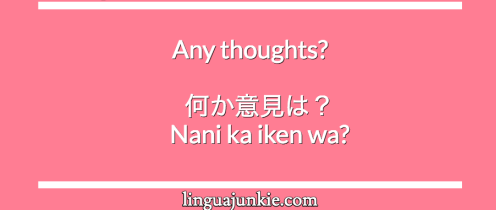
Iken means “opinion” or “view.” So here you’re asking for someone’s opinion.
16. Whatever.
- どうでもいい。
- Doudemo ii.
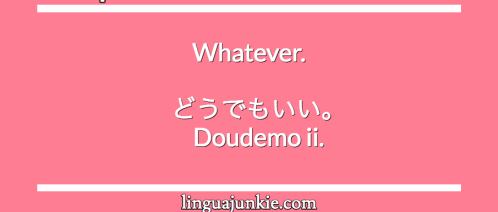
This can be used in good and bad situations. Good as in – “Yes, we can eat wherever, it’s all fine” and bad as in… well you know.
17. That’s just crap.
- 全くダサい。
- Mattaku dasai.
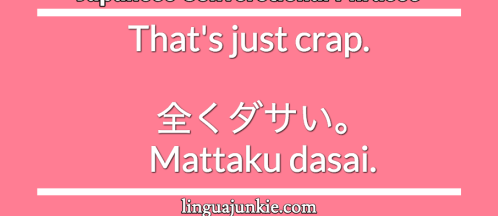
Be honest, you want to say this sometimes. Mattaku means “really, truly, completely” and dasai means “uncool.” However, uncool is just a literal translation and doesn’t capture the full feelings of dasai. Not a nice phrase to use though.
18. Things have been a bit difficult.
- ここんとこ、ちょっと難しい状況で。
- Kokontoko, chotto muzukashii joukyou de.
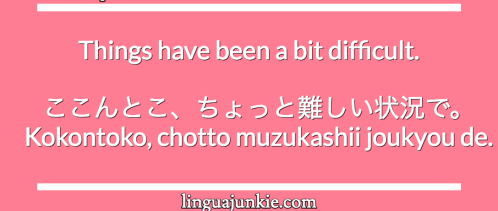
Great response to use when someone asks you how things are… and you want to give a tough answer without revealing too much. Kokontoko means “Lately” or “these days” and joukyou (super common word, memorize it) means “situation.”
19. It’s a bit more complex than that.
- それより、もうちょっと手が込んでる。
- Sore yori, mou chotto te ga konderu.
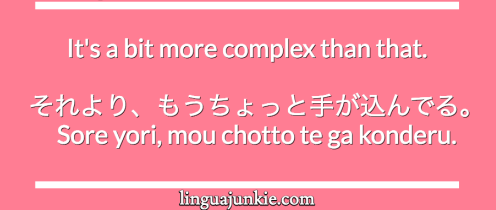
Another great response and one of the more smarter Japanese conversational phrases here. Situations aren’t as simple as people make them out to be. Let your friends know this – going to the gym IS NOT JUST GETTING UP AND GOING. There’s a lot of thought and deliberation. It’s complicated!
Good word: te ga konderu comes from te ga komu, meaning “to be intricate” or “to be complex.”
20. I see it as a waste of money.
- それから見て取れるのは、お金がもったいないということ。
- Sore kara mitetoreru no wa, okane ga mottainai to iu koto.
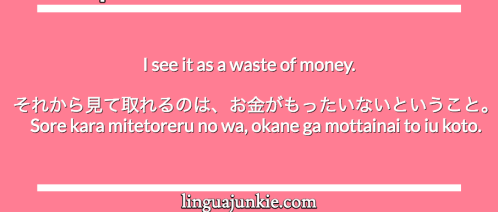
Good response in conversations. Someone shows you their Gucci money-clip… that’s literally a $300 piece of metal… to hold money. And well, in my opinion, that’s just a waste of money. Mitetoreru comes from mitetoru meaning “to perceive.”
21. Why me?
- なんで、僕がこんな目に
- Nande, boku ga konna me ni.
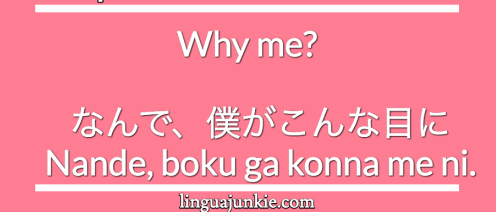
If not you, then who!? You’re the chosen one, reader. Ah, the question everyone loves asking. Well, now you know it in Japanese. Use it next time 1) you fail a test, 2) lose your wallet, 3) get pregnant or 4) get hit by a flying pig.
22. I’ve been blown away by the whole thing.
- 全てが驚嘆の連続です。
- Subete ga kyoutan no renzoku desu.
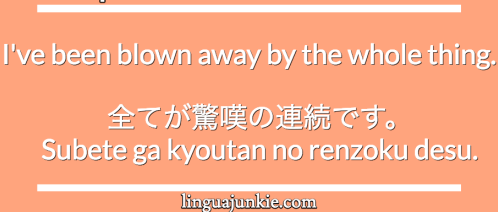
Has someone left you dumbfounded? Kyoutan means “admiration.” And renzoku means “continuing.”
23. That’s a bit short notice.
- ちょっと急だな。
- Chotto kyuu da na.
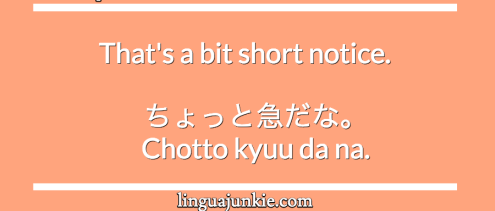
Kyuu means “abrupt, urgent” or “sudden.” Good reaction or response to use when someone wants you to do something to soon. Go out clubbing? Eat where? Hang out with who!? Short notice, bro! This is a pretty casual, yet, polite excuse.
24. No time for that now.
- 今はそんなことしてる時間がない。
- Ima wa sonna koto shiteru jikan ga nai.
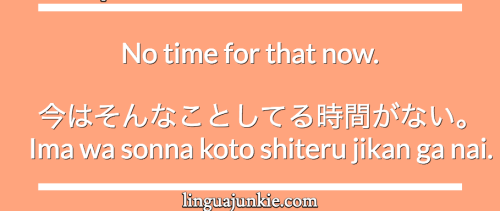
All common vocabulary in this sentence so hopefully you can understand. Overall, good phrase, but definitely rude. Feel free to use it on friends only.
25. I’m over it now, though.
- もう回復したけどね。
- Mou kaifuku shita kedo ne.
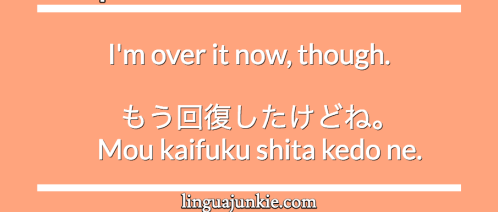
Kaifuku means “restoration” or “improvement.” You’ll hear people say this after illnesses, bad situations and sad situations. Sad phrase. I’m sorry. Let’s move onto happiness, junkies.
26. Too much to ask?
- 高望みしすぎ?
- Takanozomi shisugi?
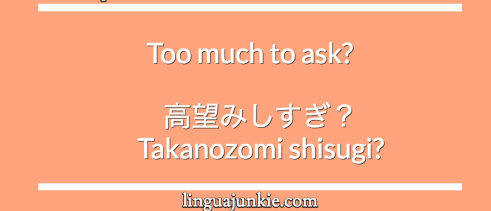
Takanozomi means “aiming too high.” And shisugi means “to do too much.” This actually comes from shisugiru (to overdo, to do too much) but the “ru” gets dropped in casual form.
Now, “to ask” is implied based on context. So, the literal meaning here is “Am I overdoing/doing too much?” but you’d need to use it in the right situations. Whether you’re asking someone for somethings, adding too much salt or speaking TOO MUCH Japanese.
27. I’m not entirely sure why.
- なぜかは全然わからない。
- Naze ka wa zenzen wakaranai.
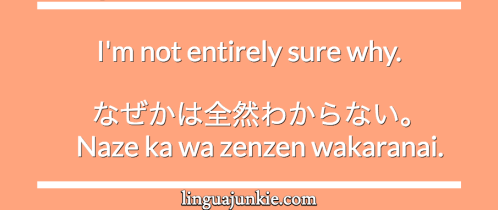
Or, you can simply say “wakaranai,” literally meaning “i dont understand” but it can be interpreted as “I have no idea,” “no clue” and so on. This is just a more nuanced, unique way to express yourself. AND it’s good for sounding like a good Japanese speaker.
28. If I was you, I wouldn’t care.
- もし私があなただったら、気にしない。
- Moshi watashi ga anata dattara, ki ni shinai.
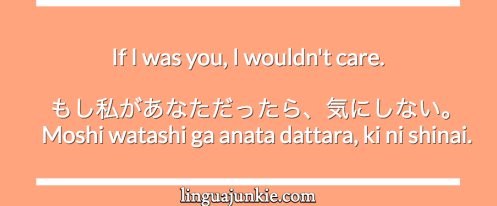
Moshi means “if” and “ki ni shinai” means “don’t care” – it comes from ki ni suru – to care. You can even say “I don’t care” by saying Ki Ni Shinai. Let’s add that into the lesson.
Bonus phrase – Now you know how to say I don’t care in Japanese.
- I don’t care.
- 気にしない。
- ki ni shinai.
29. I knew it!
- やっぱりそうだったんだ!
- Yappari sou dattanda!
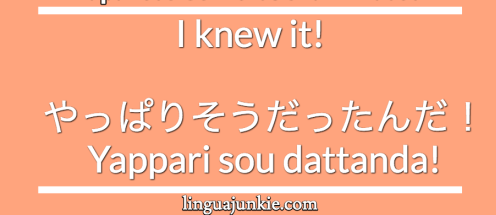
One of the most awesome Japanese conversational phrases. Everyone wants to say “I knew it!” and confirm their suspicions. Very common reaction and response to use. You’ll hear this often.
30. That’s not really important any more.
- もはやそれはそんなに重要じゃない。
- Mohaya sore wa sonna ni juuyou janai.
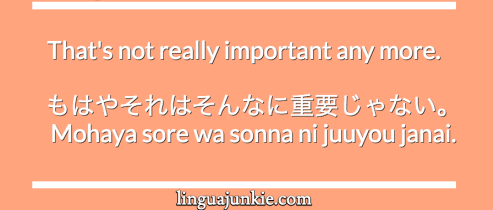
Mohaya means “no longer” or “not anymore.” Juuyou means “important” and be sure to remember this word and Kanji. You’ll see it everywhere. Good phrase to use when your friend keeps talking about things that just… aren’t important.
And that’s it. Now you know the top 30 Japanese conversational phrases. Do you like any of these – which do you use the most?
Let me know what you think and leave me a comment below.
Be sure to review this lesson!
– The Main Junkie
P.S. I highly recommend this for Japanese learners. If you REALLY want to learn to Japanese with effective lessons by real teachers – Sign up for free at JapanesePod101 (click here) and start learning!

it would be great if the pronunciation was listed after the words